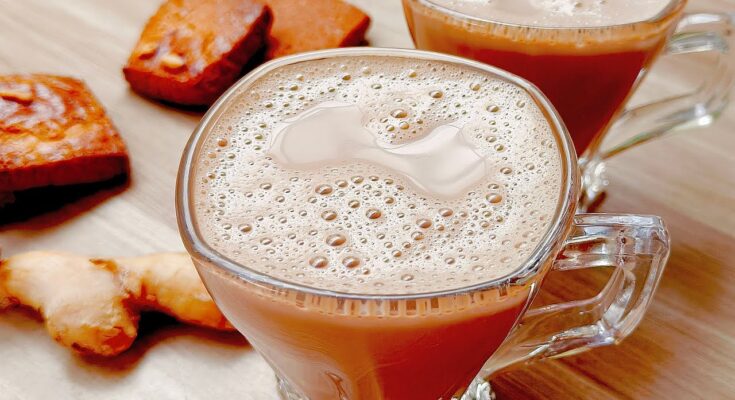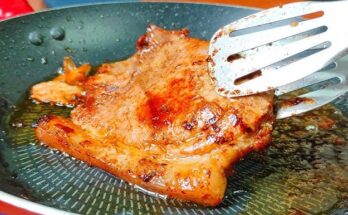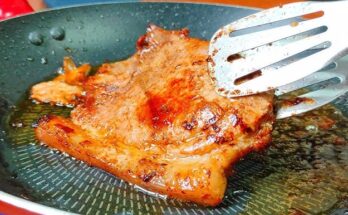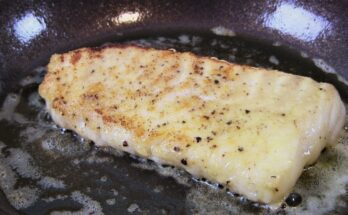Ginger Root Tea Recipe: Let’s be real for a second—there’s something magical about a warm cup of ginger root tea. It’s like wrapping yourself in a cozy blanket, but from the inside out. Whether you’re trying to fight off a cold, ease an upset stomach, or just relax after a long day, ginger tea hits the spot every single time.
But here’s the thing: not all ginger teas are created equal. Those store-bought tea bags? They barely scratch the surface. The real magic happens when you make it from scratch with fresh ginger root. That’s when you get the full punch of flavor, aroma, and health benefits.
In this guide, I’ll walk you through how to make authentic ginger root tea—step by step. We’ll cover everything: the ingredients, the best techniques, and how to put your own spin on it. So if you’re ready to elevate your tea game, let’s get into it.
List of Ingredients You’ll Need
Making ginger root tea is super simple, but having the right ingredients can make a big difference in flavor and effectiveness. Here’s what you’ll need to get started:
Basic Ingredients:
- Fresh ginger root (2–3 inches long) – peeled and sliced or grated
- Filtered water (2–3 cups) – clean water is key to a pure taste
Optional Add-ins (for taste and added health benefits):
- Lemon juice – adds brightness and vitamin C
- Raw honey – natural sweetness with antibacterial properties
- Cinnamon stick – adds warmth and enhances flavor
- Fresh mint leaves – cool, refreshing touch
- Turmeric root or powder – extra anti-inflammatory boost
- Black pepper (a pinch) – enhances turmeric absorption
Tools You’ll Need:
- Saucepan or small pot
- Knife and cutting board
- Fine mesh strainer or tea infuser
- Mug or teacup
- Grater (optional, for stronger brew)
That’s it. No fancy equipment, no hard-to-find ingredients. Simple, clean, and super effective.
How to Choose the Best Ginger Root
Not all ginger roots are created equal, and choosing the right one can make or break your tea.
Look for These Qualities:
- Firmness: A good ginger root should feel firm and heavy. If it’s soft or shriveled, skip it.
- Smooth Skin: The skin should be taut and slightly shiny—not wrinkled.
- Fresh Aroma: Give it a sniff. It should smell fresh and spicy, not dull or earthy.
Organic vs. Non-Organic:
Organic ginger tends to be fresher and free from pesticides. Since you’re often using the peel (even if you don’t eat it), organic is worth the extra buck.
How to Store Ginger:
- In the fridge: Wrap in a paper towel and place in a ziplock bag.
- In the freezer: Peel and slice, then store in an airtight container. Lasts months!
Using high-quality ginger guarantees not only better flavor but also more of those lovely health benefits you’re looking for.
Step-by-Step Guide to Make Ginger Root Tea
Now for the fun part—brewing your tea. Here’s the exact process I follow to make the perfect cup.
Step 1: Preparing Your Ingredients
Gather fresh ginger root, water, and optional add-ins like lemon, honey, or turmeric. Choose firm, smooth ginger for the best flavor. Rinse thoroughly to remove any dirt.
Step 2: Slicing vs. Grating Ginger – What’s Better?
Slicing ginger produces a mild, clean tea, while grating releases more oils and creates a stronger, spicier brew. Choose slices for everyday sipping and grated ginger when you want a powerful, warming cup.
Step 3: Boiling Process Explained
Add the sliced or grated ginger to a pot of cold water. Starting with cold water helps extract flavor more evenly. Bring it to a gentle boil over medium heat.
Step 4: Simmering Tips for Best Flavor
Once boiling, reduce the heat and let the ginger simmer. This slow extraction deepens the flavor and brings out ginger’s natural warmth and aroma.
Step 5: How Long to Steep Ginger for Strong Tea
Steep 10–20 minutes depending on taste. For a lighter tea, steep 5–8 minutes; for a bold, spicy cup, let it simmer longer.
Step 6: Straining and Serving
Strain the tea into a mug. Add honey, lemon juice, or mint if desired. Serve hot and enjoy a comforting, health-boosting drink!
Optional Flavor Additions
Ginger tea is amazing on its own, but sometimes you want to mix it up or boost certain health benefits. That’s where optional flavor additions come in. These not only enhance the taste but also add nutritional value. Let’s go over a few delicious and health-packed ideas.
Lemon Juice
Adding a splash of lemon gives your tea a tangy freshness and provides a solid dose of vitamin C. It also helps balance the spicy kick of ginger. Plus, lemon supports liver detox and gives your immune system a friendly nudge—perfect during flu season.
- Add the lemon juice after brewing and straining the tea.
- Use fresh lemon, not bottled juice, for the best flavor and nutrition.
- A slice of lemon can also be added directly into the mug for extra aroma.
Raw Honey
Raw honey is a natural sweetener with antibacterial properties. It soothes sore throats and helps balance the bold spice of ginger. But timing is key:
- Never add honey to boiling hot tea—it destroys the enzymes.
- Wait until the tea cools slightly before stirring it in.
Cinnamon Stick
Want a little warmth and depth? Drop in a cinnamon stick during the simmering process. It adds a comforting aroma and helps regulate blood sugar levels.
Turmeric
This powerful anti-inflammatory root pairs beautifully with ginger. Use a small piece of fresh turmeric or ¼ teaspoon of powder. Don’t forget a tiny pinch of black pepper—it increases the absorption of curcumin, turmeric’s active compound.
Mint
For a refreshing finish, steep a few fresh mint leaves with your tea. Mint helps with digestion and adds a cooling counterbalance to the spicy ginger.
Experiment with combinations! Lemon + honey is classic, but turmeric + cinnamon + black pepper creates a golden wellness blend that feels like a health spa in a cup.
Sweetening Tips
We all have different tastes when it comes to sweeteners. Some like it naturally spicy, while others need a touch of sweetness. Here are the best options depending on your health goals:
Natural Sweeteners:
- Raw honey – great for immunity, best added after cooling.
- Maple syrup – a vegan alternative with a richer taste.
- Agave nectar – neutral flavor, good in iced versions.
Low-Glycemic Alternatives:
If you’re watching your blood sugar:
- Stevia – natural and calorie-free, but use sparingly as it can be overpowering.
- Monk fruit extract – subtle and doesn’t spike insulin levels.
Sweetener Tips:
- Add gradually—start with ½ teaspoon and adjust to taste.
- Stir only after the tea cools to avoid degrading nutrients.
- Taste test every batch. Ginger strength varies, so sweetness levels may need tweaking.
Want to go sugar-free? Trust me—if your ginger is fresh and your lemons are juicy, you might not need sweetener at all.
Serving Suggestions
Ginger tea is super versatile when it comes to how and when you serve it. Let’s look at a few ways you can enjoy it, whether you’re in need of a warm hug or a cooling refresh.
Hot Ginger Tea
This is the classic way. It’s comforting, perfect for chilly mornings, sore throats, or winding down after a long day.
- Serve in a ceramic mug for best heat retention.
- Add a slice of lemon or sprinkle of cinnamon on top for aroma.
Iced Ginger Tea
On hot days, chilled ginger tea hits the spot. It’s refreshing and energizing.
- Let your brewed tea cool down to room temperature.
- Pour over ice and garnish with mint or citrus slices.
- Store in a pitcher in the fridge—good for up to 3 days.
Best Times to Drink Ginger Tea:
- Morning: Kickstart digestion and metabolism.
- Post-meal: Aid in digestion and prevent bloating.
- Before bed: Relax and reduce inflammation overnight.
Just remember, if you’re sensitive to caffeine or spice before bed, keep the brew milder in the evening.
Health Benefits of Ginger Root Tea
Alright, let’s talk benefits—because this tea isn’t just tasty, it’s a powerhouse for your health. Ginger root tea is one of the oldest herbal remedies out there, and for good reason. Here’s what it does:
1. Anti-Inflammatory Superpowers
Ginger contains compounds like gingerol that naturally reduce inflammation. It’s great for people dealing with arthritis, muscle soreness, or chronic joint pain.
2. Supports Digestion
Ginger tea is famous for easing digestion. Whether you’re dealing with gas, bloating, or just overdid it at lunch, a cup of ginger tea can soothe your stomach and get things moving smoothly.
3. Immune Booster
Those anti-bacterial and antiviral properties come in handy, especially during cold and flu season. Add lemon and honey, and you’ve got a natural immunity shot in tea form.
4. Nausea Relief
Whether it’s motion sickness, morning sickness, or an upset stomach, ginger tea helps reduce nausea. It’s gentle enough to drink daily, especially on an empty stomach.
5. Menstrual Pain Relief
Ladies, this one’s for you—ginger tea can help ease menstrual cramps and lower the intensity of discomfort during your cycle. It’s a natural muscle relaxant and anti-inflammatory.
Bottom line? A cup of ginger tea a day is one of the simplest wellness habits you can add to your routine.
Detox Benefits of Ginger Tea
Ever feel like your body needs a reset? That’s where ginger tea steps in like a cleansing rain after a storm. It’s a natural detoxifier that helps your body flush out built-up toxins gently and effectively—no crazy juice cleanses required.
1. Promotes Sweating and Natural Detox
One of the first things you might notice after drinking hot ginger tea is that you start to sweat a little. This is actually a good thing. Sweating is one of the body’s ways of releasing toxins. Ginger’s warming effect helps stimulate this natural cleansing process.
2. Liver Support
The liver is your body’s main detox organ, and ginger helps it function more efficiently. It encourages bile production, which breaks down fats and assists in flushing out waste. Combine it with lemon, and you’ve got a duo that gently supports your liver without overworking it.
3. Cleanses the Digestive Tract
Ginger tea gets things moving—literally. It improves digestion and keeps your intestines free of buildup that can slow down your metabolism or cause discomfort. This is especially useful after a heavy meal or when you’ve been eating poorly for a few days.
4. Reduces Water Retention
Ginger acts as a mild diuretic, helping you release excess fluid retention and reduce bloating. If you wake up feeling puffy, ginger tea can help de-bloat and give your gut a much-needed break.
5. Boosts Circulation
Better circulation means your organs get more oxygen and nutrients, and your body becomes more efficient at cleaning itself. Ginger’s warming effect helps improve blood flow naturally.
For a deeper detox, try pairing your ginger tea with a clean diet for a few days—think leafy greens, whole grains, and lots of water. You’ll feel lighter, more energetic, and refreshed from the inside out.
Ginger Tea for Weight Loss
Let’s be real—no tea is a magic weight-loss solution. But ginger tea? It definitely plays a supportive role if you’re on a weight-loss journey. Think of it as your metabolism’s best friend.
1. Boosts Metabolism
Ginger is thermogenic, meaning it slightly raises your body temperature and increases calorie burn. That’s right—just sipping it can give your metabolism a gentle kick. It’s not extreme, but over time, those small boosts add up.
2. Appetite Control
Ever notice how ginger tea makes you feel full and satisfied? That’s not your imagination. Drinking it before or after a meal can help curb cravings, reduce emotional eating, and keep you from going back for seconds.
- Try drinking a cup 30 minutes before meals to control appetite.
- Add a slice of lemon for extra metabolism support.
3. Balances Blood Sugar Levels
Stable blood sugar = fewer cravings. Ginger can help regulate insulin response, which prevents energy crashes and those desperate “give me sugar now!” moments.
4. Combats Water Retention
Feeling bloated can make you feel heavier than you actually are. Ginger’s natural diuretic properties help flush out excess water, giving you a flatter belly without the bloat.
5. Pairs Perfectly with Healthy Habits
Want better results? Pair your ginger tea with:
- A balanced diet (think lean protein, veggies, and fiber)
- Regular movement (even just a 20-minute walk)
- Good sleep (yep, that matters too)
Ginger tea isn’t the hero of the story—it’s the loyal sidekick that helps you reach your goals faster and feel better doing it.
Best Time to Drink Ginger Tea for Health Benefits
Timing matters when it comes to reaping the full benefits of ginger tea. While there’s no “wrong” time to enjoy it, some moments in your day offer extra perks. Let’s break it down.
1. First Thing in the Morning
Want to jump-start your digestion and metabolism? Sip on ginger tea first thing when you wake up. It wakes up your gut, flushes out toxins, and gets your body ready to absorb nutrients from breakfast.
Pro tip: Add lemon and warm (not boiling) water for a natural detox tonic.
2. After Meals
Struggling with bloating or heavy digestion? Ginger tea can help. Drinking it after meals promotes better digestion and can help prevent gas and discomfort. Especially useful after large or fatty meals.
- Great after dinner to avoid late-night indigestion
- Add mint for an extra soothing effect
3. Before Bed
Surprised? Ginger tea is actually great at night—especially if you’re sore, inflamed, or just need to wind down. Its anti-inflammatory properties help your body recover overnight.
- Try it 1 hour before bed with a touch of honey and turmeric
- Make sure it’s mild so it doesn’t keep you too alert
4. Pre-Workout (Mild Version)
Need a little pre-workout boost? A cup of ginger tea (with lemon) about 30 minutes before a workout can enhance energy, improve circulation, and prime your muscles.
Just keep the blend light—you don’t want to feel too full or spicy during exercise.
Storing and Reheating Ginger Tea
Want to make a big batch and sip it throughout the week? Smart move. Here’s how to store your tea the right way, so it stays fresh and flavorful.
1. Storing Leftover Tea
- Let the tea cool to room temperature.
- Transfer to a glass jar or bottle with a lid (like a mason jar).
- Store in the fridge for up to 3–4 days.
Avoid plastic containers—they can absorb the aroma and mess with the taste over time.
2. Reheating Tips
- Pour into a small saucepan and gently reheat over low heat—don’t boil!
- You can also microwave it, but cover it with a paper towel to prevent splashes and heat evenly.
Avoid reheating with lemon or honey already added—it can affect the taste and nutrient quality. Always add them fresh after reheating.
3. Can You Freeze Ginger Tea?
Yep! Freeze it in:
- Ice cube trays (great for adding to smoothies or water)
- Small containers for batch reheating
It will last up to 2 months in the freezer, but be sure to label your container with the date.
Common Mistakes to Avoid
Even though making ginger root tea seems super simple, a few missteps can dull the flavor, reduce the health benefits, or even make it taste… well, kind of gross. Let’s go over the most common mistakes people make and how to avoid them so your ginger tea turns out perfect every time.
1. Overboiling the Ginger
Boiling the ginger for too long or at too high a temperature can turn your tea bitter. While ginger is strong and robust, overcooking it breaks down its natural oils and creates a harsh taste.
How to fix it:
- Once your water starts boiling, reduce the heat and let it simmer.
- Stick to a simmer time of 10 to 20 minutes. Longer isn’t always better.
2. Using Old, Dried-Out Ginger Root
Ginger that’s been sitting in the fridge too long, or worse, has dried out completely, will give you weak tea. The flavor won’t be as bold, and the health benefits drop significantly.
How to fix it:
- Always check your ginger before using. It should be firm, moist inside, and fragrant.
- Buy fresh weekly if you drink ginger tea often.
3. Adding Honey While Boiling
Honey is amazing for your immune system, but not when it’s boiled. Heating honey to high temperatures destroys many of its beneficial enzymes and antibacterial properties.
How to fix it:
- Let the tea cool slightly (until it’s warm but not piping hot).
- Then stir in your honey to preserve all its natural goodness.
4. Skipping the Peel (Or Not Washing It)
Did you know that a lot of ginger’s nutrients are in the peel? Many people toss it out or don’t wash it thoroughly, missing out on the good stuff or risking contaminants.
How to fix it:
- If you’re using organic ginger, leave the peel on—just scrub it well.
- For non-organic, peeling is better unless you scrub deeply.
5. Not Adjusting for Personal Taste
Ginger root can be very strong. What’s soothing to one person might be too spicy for another. If you’re not tweaking your recipe based on your taste preferences, you could end up with tea that’s too intense—or too bland.
How to fix it:
- Start with a smaller piece of ginger (1 inch) and work your way up.
- Taste-test halfway through simmering and adjust the steep time.
Avoiding these simple mistakes can take your ginger tea from “meh” to “whoa, that’s good!” every single time.
FAQs about Ginger Root Tea Recipe
1. How much ginger is too much in tea?
While ginger is generally safe, too much can cause stomach upset or heartburn for some people. For daily tea, stick to 1 to 2 inches of fresh ginger root per 2-3 cups of water. If you’re unsure, start small and increase gradually.
2. Can I drink ginger tea every day?
Absolutely! Drinking a cup or two a day is considered safe and even beneficial. Just monitor how your body reacts—some people may feel a bit too stimulated if they drink it in large quantities.
3. Is ginger tea safe during pregnancy?
In moderation, yes. Ginger tea is often used to help with nausea during pregnancy, especially in the first trimester. That said, always check with your doctor before adding it to your routine if you’re expecting.
4. What’s the best ginger-to-water ratio?
A good starting point is 1 to 2 inches of ginger root per 2-3 cups of water. You can adjust this based on how strong you like your tea. If it’s too spicy, reduce the amount or steep for a shorter time.
5. How do I make ginger tea less spicy?
If your tea turns out too strong or spicy, try one of these tricks:
- Use thinner slices instead of grated ginger
- Reduce the simmering time
- Add more water or a splash of lemon juice or honey to mellow it out
Conclusion
Ginger root tea isn’t just a drink—it’s an experience. From the moment you slice that fresh ginger and the aroma hits the air, to the final warming sip that soothes your throat and calms your stomach, it’s pure, natural comfort in a cup.
Whether you’re brewing a single mug or making a batch for the week, this tea brings real health benefits with zero side effects. It supports your immune system, aids digestion, eases inflammation, and even helps with weight loss and detox.
But beyond the science, it’s about ritual. Taking a few minutes to brew your own tea is a small act of self-care that grounds you in the moment. It’s warm, it’s personal, and it’s good for you.
So go ahead—grab some fresh ginger, turn on the stove, and get brewing. Once you’ve made it a few times, feel free to experiment. Try it with lemon, turmeric, honey, or mint. Make it hot or iced. Sweet or spicy. Light or bold.
One cup at a time, you’ll discover just how powerful (and delicious) this simple root can be.



